For most Indians, the mention of Lakshadweep would bring to mind images of sandy beaches and blue waters dotted with fishing boats. However, India's smallest Union Territory (UT) is now facing a legislation that could forever redefine its legacy—Draft Lakshadweep Development Authority Regulation, 2021 (LDAR 2021).
Announced by Praful Khoda Patel, Administrator of Lakshadweep, the LDAR 2021 gives the administrator swooping powers of land appropriation for the purpose of 'development', which several critics have termed autocratic and an attempt to "saffronize" the islands. So where is Lakshadweep? What is LDAR 2021? How will it affect the UT? And why is it being criticized? Let's take a look.
A Quiet Paradise
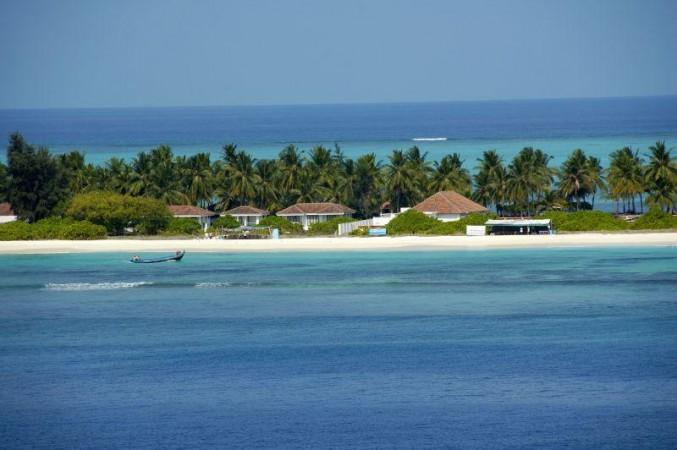
Lakshadweep, which means 'one lakh islands', is a group of 36 islands in the Arabian Sea. They have a collective area of 32 sq km, and only 10 islands are inhabited. Kavaratti—which is also the name of the atoll on which the town is situated—is the capital of the UT. Lakshadweep has a lagoon area of 4,200 Sq. Kms, and coastal line of around 132 Kms. The islands are located at a distance of 220 to 440 km from the coastal city of Kochi in Kerala.
The islands have been under the control of several kingdoms and rulers throughout their history. More recently, Lakshadweep was under the control of the Arakkal family of Kannur from 1545 to 1819. However, in 1789, Junumabe II, the 'Queen of Malabar' lost control of her fort to the British. The sovereignty over the archipelago was finally surrendered to the British direct administration in 1908 by the then ruler, Arakkal Beevi Imbichi Sultana. In return, an annual pension of Rs 23,000 was negotiated—which is still paid to the family's descendants. The islands became a UT in 1956 and were christened 'Lakshadweep' in 1973.
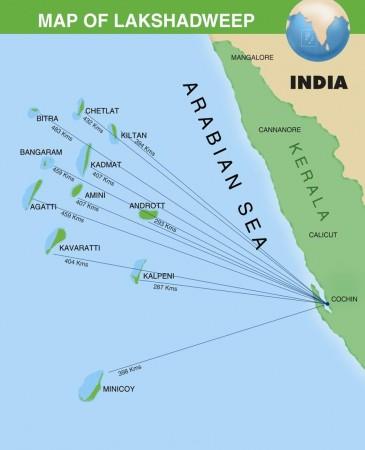
According to the 2011 Census of India, the population of Lakshadweep is approximately 64,500 or 0.01 percent of India's total population. Islam is the predominantly followed religion in the UT with Muslims forming nearly 97 percent of the population. The acceptance of Islam by the local population is said to have taken place mostly between the 8th to 15th Century AD owing to sea trade. Hinduism, Christianity, Buddhism, and Jainism, among others are some of the other religions followed by the islanders.
Key sectors in UT's economic activities are horticulture (coconut, copra, and jaggery), fisheries (Tuna), and tourism (concentrated around the islands and its three coral reefs). Despite witnessing a decline, the boat building industry—a traditional occupation—exists in certain parts of some of the islands. Coir-based industries are also among the oldest occupations carried out on the islands. The UT is also home to magnificent beaches, picturesque landscapes, and diverse flora and fauna.
Brewing of a Storm
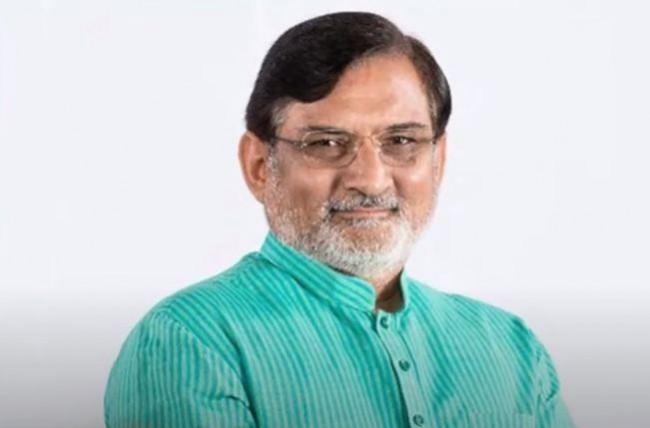
The storm surrounding the LDAR 2021 began brewing much before the announcement of its draft. Praful Khoda Patel, who had a political career in Gujarat under the Bharatiya Janata Party's (BJP) patronage, was appointed as the 35th Administrator of Lakshadweep in December 2020 following the demise of his predecessor Dineshwar Sharma.
At the time of his appointment, Patel already held the position of administrator of the UT of Dadra and Nagar Haveli and Daman and Diu. His previous appointment also courted controversy as the position of administrators of UTs (who are appointed by the President of India) has traditionally been held by officers who served in the Civil Services of India.
Among the first proposed legislations after Patel's appointment was the Draft Lakshadweep Prevention of Anti-Social Activities Act, 2021 (PASA). Introduced in January 2021, under the provisions of the act, it grants the administrator the power of unilateral detainment of an individual without any public disclosure for a period of up to one year.
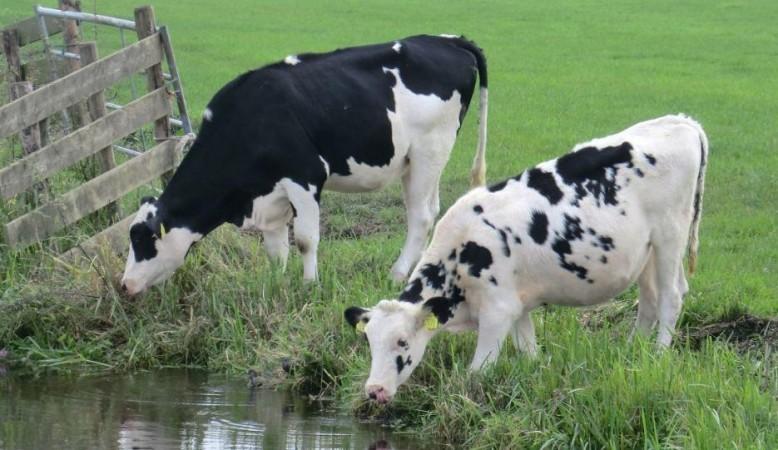
Placed in the public domain in February this year, Draft Lakshadweep Animal Preservation Regulation, 2021, if implemented, will essentially ban beef in Lakshadweep as the regulation bans the slaughter of bulls and bullocks, cows, and calves of cows. Its violations can result in a fine of up to Rs.5 lakhs or life imprisonment. Another policy, Draft Panchayat Regulation, 2021, was introduced in the same month. One of the most criticized aspects of the regulation is point 14(n) which deals with the disqualification of an individual from being a member of the Panchayat if they have more than two children after the implementation of the regulation.
Swooping Land Reforms
Notwithstanding the dissent over the other proposed legislations, the LDAR 2021 was put forward in April 2021. It grants the administrator the power to remove or relocate islanders from their own properties, for the purpose of town planning or other developmental activities. In other words, the administrator will be empowered by law to evict people from their own homes for the sake of development.
When in effect, it will give the administrator the authority of "orderly and progressive development of land in both urban and rural areas and to preserve and improve the amenities thereof; for the grant of permission to develop land and for the other powers of control over the use of land; to confer additional powers in respect of the acquisition and development of land for planning." According to Section 119 of the LDAR 2021, penalties such as imprisonment and fines can be imposed if an individual is found guilty of impeding the development plan's work or workers.
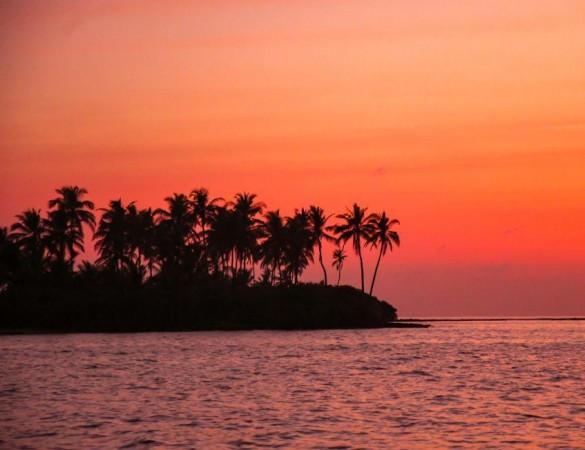
Critics of LDAR 2021 state that the legislation will lead to unrestrained mining and quarrying, and building activities, on sensitive sections of the islands. The law will also give the administrator the sovereignty to allocate zones for the purpose of industrial, residential, and commercial use, among others. Residents of the UT fear that it will give rise to forced eviction or relinquishing their rights to their land to the Planning and Developing Authority, thereby, leaving virtually no room for seeking legal remedies.
Some sections of the draft legislation, explicitly state that decisions and orders passed under the legislations are literally final and unchallengeable. For example, section 123 of the legislation states: "Save as otherwise expressly provided in this Regulation, every order passed or direction issued by the Government or the Prescribed Authority or order passed or notice issued by any Planning and Development Authority under this Regulation shall be final and shall not be questioned in any suit or other legal proceeding."
Among the several sections that have the native dwellers of the islands anxious is Section 106. It gives the administration the power of entry into any property in order to carry out inspections or surveys without receiving the consent of the owner or occupier of the property, with nearly no relaxations to it.
Criticism and Solidarity
As the conversation surrounding the proposed legislation has intensified, protests in Lakshadweep and the mainland state of Kerala have erupted. #SaveLakshadweep, #istandwithlakshadweep, and #RevokeLDAR, have dominated social media platforms, with citizens from all walks of life using them to express their support for the islanders and condemn the proposed reforms. The natives of Lakshadweep have also sought the intervention of UN Secretary-General António Guterres, and the UN's Permanent Forum for Indigenous Issues
News reports from Lakshwadeep are quite serious. Challenges imposed on their lives, livelihoods and culture cannot be accepted. Kerala has a strong relationship, a long history of cooperation with LD. Unequivocally condemn devious efforts to thwart it. Perpetrators should desist.
— Pinarayi Vijayan (@vijayanpinarayi) May 25, 2021
In a recent tweet, Pinarayi Vijayan, Chief Minister of Kerala, expressed his solidarity with the citizens of the island and condemned the interference with their way of life. "News reports from Lakshwadeep are quite serious. Challenges imposed on their lives, livelihoods, and culture cannot be accepted. Kerala has a strong relationship, a long history of cooperation with LD. Unequivocally condemn devious efforts to thwart it. Perpetrators should desist," the tweet read.
Extending her support to the people of Lakshadweep, Priyanka Gandhi Vadra, General Secretary of Indian National Congress, voiced her objection to LDAR 2021 on the micro-blogging platform. "The people of Lakshadweep deeply understand and honour the rich natural and cultural heritage of the islands they inhabit. They have always protected and nurtured it. The BJP government and its administration have no business to destroy this heritage, to harass the people of Lakshadweep or to impose arbitrary restrictions and rules on them," read a section of her tweet.
Prithviraj Sukumaran, a popular Malayalam actor, also took to Twitter, and in a lengthy post spoke about his experiences in the UT and among its people. He stated that the people of the land were unhappy with LDAR 2021 and questioned the price at which the government chose to implement the said 'developments'. He wrote: "How does disrupting the way of life of a centuries-old peaceful settlement become an acceptable means of progress? How will threatening the balance of a very delicate island ecosystem with no regard for potential consequences pave the way for sustainable development?"
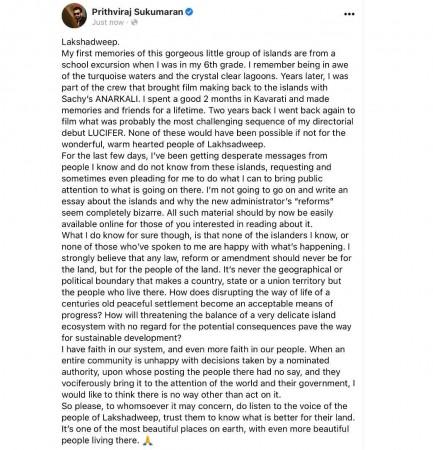
Call for Withdrawal
The furore surrounding LDAR 2021 has also seen several lawmakers write to the President, Vice-President, and the Prime Minister, seeking the legislation's withdrawal and re-evaluation. Rahul Gandhi, Congress leader and Member of Parliament from Wayanad, terming the policies "draconian" and "anti-people", wrote to PM Narendra Modi criticizing the provisions of the legislation.
"The administrator's attempt to undermine ecological sanctity of the island is evident in the draft of Lakshadweep Development Authority Regulation issued recently. The provisions undermine safeguards pertaining to land ownership, dilute environmental regulations and severely limit legal recourse to affected persons," Gandhi wrote in his letter.
Elamaram Kareem, Member of Parliament, said in a social media post that "After Kashmir Lakshadweep is the new target of Modi Govt." He wrote to President Ram Nath Kovind, requesting the administrator's withdrawal. In the letter, he drew the president's attention to several issues such as the threat and loss of livelihood, changes to COVID-19 SOPs that led to the rise in the number of cases in the UT, and lifting of restrictions on the use of alcohol, among others.
"In the name of reforms and schemes the new administrator is trying to completely destroy the traditional life of the people of Lakshadweep. Many of the existing laws are being amended unilaterally and new legislations are being drafted without any consultation with the people or their elected representatives," Kareem wrote.
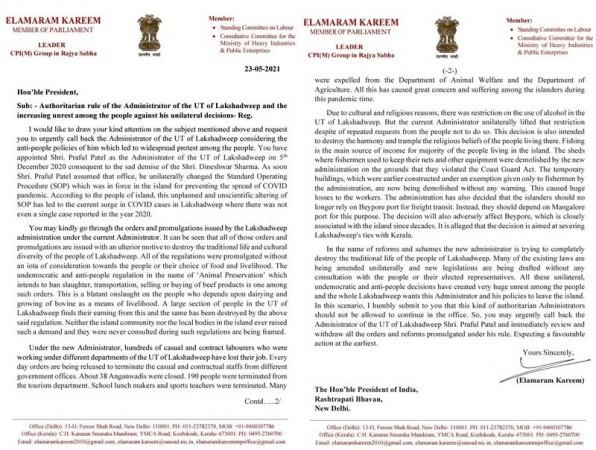
Mohini Giri, Former Chair of NCW, Wajahat Habibullah, former Administrator of Lakshadweep, and Syeda Hameed, former Member of Planning Commission in-charge of Andaman & Nicobar and Lakshadweep, have written to Vice-president M. Venkaiah Naidu and the Governor of Kerala, conveying their concerns about LDAR 2021 and seeking its withdrawal.
Highlighting the cultural and ecological heritage of the islands, they called attention to the economic hardships the people will have to face if their dependence on the resources bestowed by land is disrupted. "What the islands need is access to safe and secure healthcare, education, just governance, food security and livelihood options linked with their ecosystem, including the rich resource of tuna fishery in surrounding waters," the trio emphasized.
Opposition from Within
Interestingly, some members of the BJP's cadre in Lakshadweep have also risen in opposition to the reforms. Earlier this week, eight leaders from Bharatiya Janata Yuva Morcha (the party's youth wing) in the UT resigned in protest against the administrator's actions and accused him of "destroying peace and tranquility" of the region. Among the resignees were top-ranking members—P.P Mohammad Hashim (State General Secretary) and M.C Muthukoya (former State Vice-President).
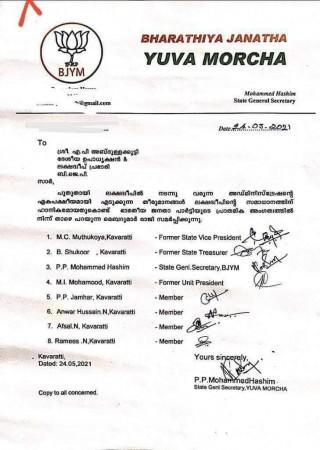
Mohammad Kasim, President of BJP's Unit in Lakshadweep, has joined the protest as well. The leader stated that the people should have been taken into confidence before the announcement of such sudden changes and said that he has written to the party's top brass in New Delhi expressing the same.
"It seems some of the grievances of the island people are genuine. It is always good to seek the opinion of people and their elected representatives before taking decisions. I have written to both PM Modi and Home Minister Amit Shah, about this," he told Hindustan Times.
Administrative Push Back
Despite the widespread outcry, Patel and other administrative authorities have maintained that LDAR 2021 will benefit the people of Lakshadweep. Leaders within the BJP have alleged the spread of "misinformation". In a recent media address, S. Asker Ali, District Collector of Lakshadweep, termed the concerns surrounding the legislation a "motivated misinformation campaign, which does not represent those living in Lakshadweep". He said that the reforms are aimed at developing the island on the lines of Maldives.
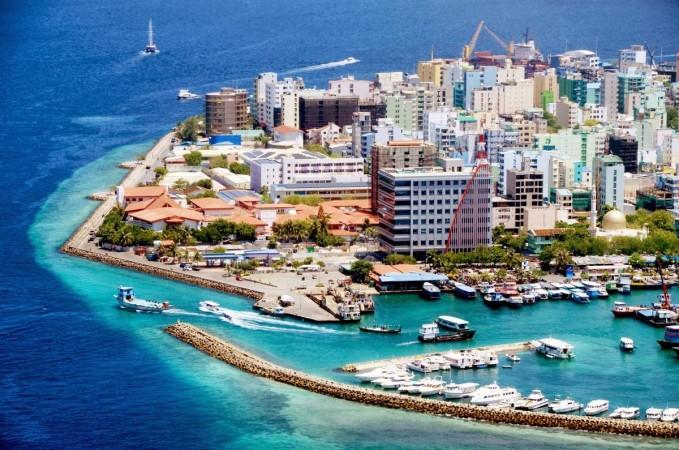
Defending other proposed policies in the region, Ali remarked, "So we are planning for a holistic development for these islands. From a security point of view Lakshadweep islands are very critical. So we cannot take a chance. Basically, we wanted to prepare ourselves for the requirements of the future considering the past experience and present emerging situations."
So what does the man in the middle of the storm have to say? Patel dismissed the natives' worries about the loss of their lands as "misplaced and other people's agenda". He told ThePrint that his "only agenda is the development of Lakshadweep". "Why is it that people are waiting to go to Maldives, but are not even willing to come to Lakshadweep? It is to develop tourism and for long term benefits that we are introducing the LDAR," he said comparing the UT's potential for tourism to the Maldives.
And about PASA, Patel pronounced that if people have not engaged in any wrongdoing, there was no need for them to be worried about its implementation. "Only those who have committed a crime will be penalised, for the others, it should not be an issue. In the rest of the country, under the Indian Penal Code there is Section 302 for a reason," he declared.














